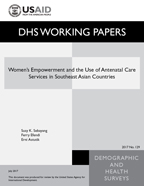- PUBLICATIONS
- JOURNAL ARTICLES
- ACCESS PUBLICATIONS
Publications Summary
- Document Type
- Working Papers
- Publication Topic(s)
- Child Health and Development, Gender, Maternal Health
- Country(s)
- Cambodia, Indonesia, Myanmar, Philippines, Timor-Leste
- Language
- English
- Recommended Citation
- Sebayang, Susy K., Ferry Efendi, and Erni Astutik. 2017. Women’s Empowerment and the Use of Antenatal Care Services in Southeast Asian Countries. DHS Working Paper No. 129. Rockville, Maryland, USA: ICF.
- Download Citation
- RIS format / Text format / Endnote format
- Publication Date
- July 2017
- Publication ID
- WP129
Download
 Women's Empowerment and the Use of Antenatal Care Services in Southeast Asian Countries (PDF, 633K)
Women's Empowerment and the Use of Antenatal Care Services in Southeast Asian Countries (PDF, 633K)
